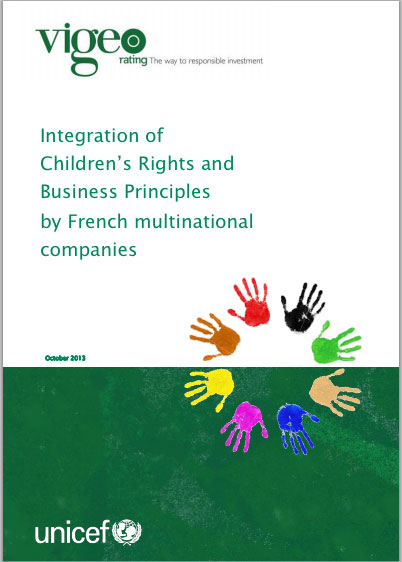Guiding principles for taking into account children's rights by CAC 40 enterprises
 UNICEF, together with UN Global Compact and Save the Children developed the Business Principles for Children’s Rights in March 2012.
UNICEF, together with UN Global Compact and Save the Children developed the Business Principles for Children’s Rights in March 2012.
They go beyond the mere question of the respect of the minimum age for employment. They gather 10 recommendations that can truly guide companies to make decisions and to improve their management processes in order to respect children’s rights and to contribute to their efficient implementation of the principles.
These 10 recommendations provide a relevant framework enabling companies to clearly and efficiently formalize and deploy their commitments.
Ten months after the adoption of these recommendations, Vigeo has gone through the way these guiding principles are taken into account by the CAC 40 enterprises.
The study shows that :
The majority of companies which have been studied show their explicit commitment to children’s rights. However, they mostly are limited to the minimum legal age for employment.
For many enterprises belonging to the CAC 40, the contribution to the elimination of child labor is a real concern because it calls for a responsible supply chain management in view of the precarious regulatory framework situation in countries where the suppliers are.
Most of the due diligence activities run by the enterprises to prevent any risk of being involved in human rights violations do not explicitly mention children’s rights in risk assessment and mapping.
Up to now, the enterprises are tackling their social responsabilities toward children’s rights mainly through charitable initiatives in education and health. BNP Paribas, Danone, L’Oréal, LVMH, Sanofi, STMicroelectronics and Vivendi seem to be the most advanced enterprises in terms of concrete initiatives on the matter.
Source : http://www.vigeo.com/csr-rating-agency/fr/etude-unicef-102013-2
- Login or register to post comments
- Français
 Recommander cette page à un(e) ami(e)
Recommander cette page à un(e) ami(e)